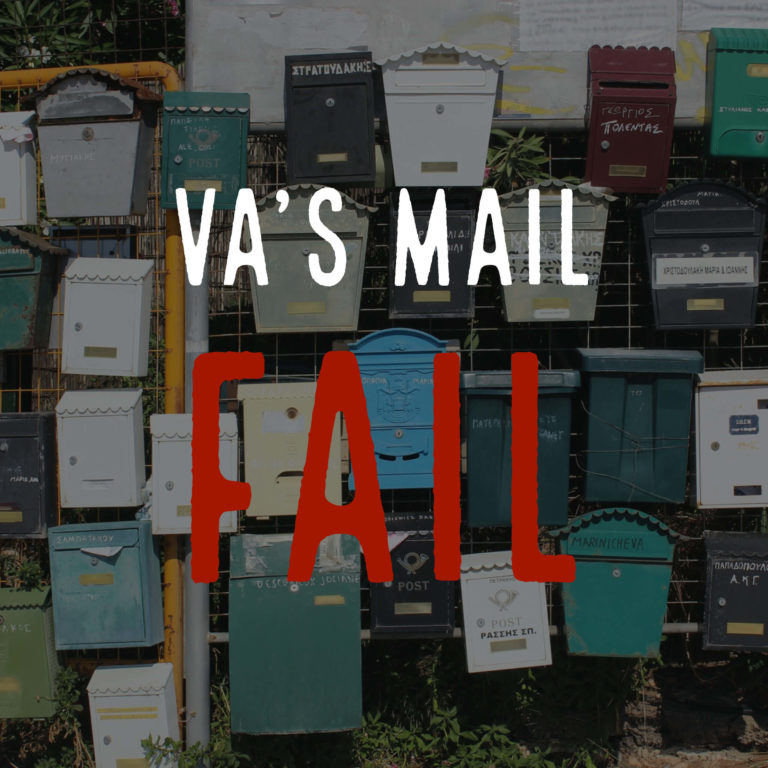VA Mail Fail – Why VA Fails to Send Decisions to Veterans and Advocates

By law, VA is supposed to send all decisional documents to claimants and their representatives, if they have one. However, VA sometimes fails to mail decisional documents in a timely fashion, or fails to mail them at all. The result is veterans and their advocates are left without proper notification of denials or grants of benefits, and may miss appeal deadlines. How can this VA mail problem be fixed?
What is Happening and Why It Matters
Over the past few years, VA has failed to send decisions to claimants as well as to their representatives. VA has a centralized mailing facility for incoming mail called the Evidence Intake Center (EIC), where mail is received and scanned into the VA’s system. However, they do not have a similar centralized system for outgoing VA mail. There are 53 VA Regional Offices that could each have different processes for outgoing mail.
If a decision is not sent to a claimant, or is sent too late, there is a risk of a veteran not being able to appeal that decision. If a veteran does not receive a decision and the appeal deadline passes, the veteran must refile their claim and start the process over again instead of appealing. This can impact effective dates and add wait time to an already lengthy process.
For example, if a Statement of the Case (SOC) is issued but neither the veteran nor their representative are notified, they may miss the appeal deadline. Claimants only have 60 days to appeal a SOC, and if those 60 days pass, the decision in the SOC can become final. At this point, if a veteran still wishes to seek those benefits, they must refile their claim.
What Happens If You Miss an Appeal Deadline?
If an appeal deadline is missed due to VA not mailing a decision, representatives and claimants can still appeal the decision and explain that the appeal is timely given VA did not give proper notice of the decision.
Under the Presumption of Regularity, VA employees are presumed to be doing their job correctly unless it can be proven otherwise. Filing an appeal after the deadline due to VA’s failure to mail a decision must include not only an appeal for the benefits themselves, but also an appeal to prove that the appeal for benefits is timely and rebut the Presumption of Regularity. It can take years for VA to acknowledge that the appeal is timely before they again take up the issue of entitlement to benefits.
Appealing the timeliness of a decision in addition to entitlement to benefits can cause a significant delay in a veteran’s case.
What Are the Laws For VA Mail?
38 U.S.C. 5104 states that the VA Secretary shall mail claimants and their representatives notice of a decision in a timely manner. The corresponding regulation is 38 C.F.R. 3.103(b)(1), which states that claimants and their representatives are to be notified of any decision impacting the “payment of benefits or granting of relief.” Although these regulations do not specifically call for the mailing of decisions, VA’s M-21 internal manual instructs VA employees to mail decisions.
How Can Representatives Find Out About Decisions?
If VA does not send a copy of a claimant’s decision to their representative, or to the claimant themselves, representatives may be able to check the claimant’s record in VA’s online system. This system is called the Veterans Benefits Management System, or VBMS. VBMS is used by VA to track all claims and appeals in a veteran’s case. Some representatives can access VBMS and see if any decisions have been issued in a veteran’s case. However, VBMS does not notify representatives that a decision has been issued.
2017 GAO Report Finds Key Issues with VA Mail Operations
In July 2017, the Government Accountability Office (GAO) released a report detailing VA’s chaotic mail practices after it was discovered that VA’s mail volume and costs are among the highest in the federal government.
The report found that VA does not reliably report mail expenditure and volume data, leaving them without an accurate picture of how much they spend on outgoing mail and how much outgoing mail they even have. The report also found that VA lacks an efficient mail management policy, and does not have “agency-wide goals” or “performance measures for its mail operations.”
Finally, the report uncovered that VA does not give mail managers the proper authority and responsibility to run the vast mailing operation. GAO states that “VA’s ability to oversee mailing practices across its facilities is limited because it has not provided its mail managers with appropriate authority and responsibilities.” Mail managers practice oversight over VA’s mail policy, but do not have any “operational role in mail management.”
What Can We Do About It?
It is important for claimants and their representatives to have open communication when a decision is issued. If a decision is mailed only to the claimant and not their representative, there is no way for the representative to know of the decision unless there is open communication with the claimant.
Additionally, veterans and advocates can reach out to their Congressperson or Senator to notify them of VA’s failure to send decisional documents.
About the Author
Share this Post
